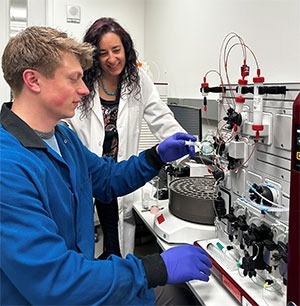Researchers at the University of Wyoming have made a significant discovery that could one day allow people living in areas without refrigeration to access life-saving treatments. Their research on the acclimation of microscopic organisms known as tardigrades to extreme conditions has revealed some surprising results.
 UW student Maxwell Packebush, of Littleton, Colo., works with Silvia Sanchez-Martinez, a senior research scientist, to purify one of the tardigrade proteins used in a study showing that the proteins can be used to stabilize an important pharmaceutical for people with hemophilia and other conditions without the need for refrigeration. Image Credit: Thomas Boothby Photo
UW student Maxwell Packebush, of Littleton, Colo., works with Silvia Sanchez-Martinez, a senior research scientist, to purify one of the tardigrade proteins used in a study showing that the proteins can be used to stabilize an important pharmaceutical for people with hemophilia and other conditions without the need for refrigeration. Image Credit: Thomas Boothby Photo
Thomas Boothby, an assistant professor of molecular biology, and colleagues have demonstrated that both natural and engineered versions of tardigrade proteins can be used to stabilize a significant pharmaceutical that is used to treat people with hemophilia and other conditions without the need for refrigeration—even in hot climates and other challenging environments.
Scientific Reports, an online, open-access journal from the publishers of Nature, published a thorough explanation of the findings on 20th March 2023.
Human blood coagulation Factor VIII, a pharmaceutical, is a crucial treatment for genetic diseases and instances of excessive bleeding. Factor VIII has a severe flaw in that it is intrinsically unstable while being crucial and successful in treating people in these situations. Factor VIII will fail without stability within a specific temperature range.
In underdeveloped regions, during natural disasters, during space flight or on the battlefield, access to refrigerators and freezers, as well as ample electricity to run this infrastructure, can be in short supply. This often means that people who need access to Factor VIII do not get it.”
Thomas Boothby, Assistant Professor, Molecular Biology, University of Wyoming
Boothby added, “Our work provides a proof of principle that we can stabilize Factor VIII, and likely many other pharmaceuticals, in a stable, dry state at room or even elevated temperatures using proteins from tardigrades—and, thus, provide critical live-saving medicine to everyone everywhere.”
Tardigrades, also known as water bears, are less than half a millimeter long and can endure being completely dried out, frozen to just above absolute zero (about minus 458 degrees Fahrenheit, when all molecular motion ceases), heated to more than 300 degrees Fahrenheit, irradiated several thousand times beyond what a human can withstand, and even survive the vacuum of outer space.
They are able to do so in part by producing a sugar called trehalose, and CAHS D, which is a protein.
Boothby and his colleagues tweaked the biophysical characteristics of trehalose and CAHS D to stabilize Factor VIII, according to the study, indicating that CAHS D is especially suitable for the therapy. Factor VIII can now be stored dry for an extended period of time and used in harsh settings without refrigeration, such as repeated dehydration and rehydration.
According to the researchers, the same procedure can be applied to other biologics, or medications made from or including living organisms, such as vaccines, antibodies, stem cells, blood, and blood products.
Boothby further stated, “This study shows that dry preservation methods can be effective in protecting biologics, offering a convenient, logistically simple, and economically viable means of stabilizing life-saving medicines. This will be beneficial not only for global health initiatives in remote or developing parts of the world, but also for fostering a safe and productive space economy, which will be reliant on new technologies that break our dependence on refrigeration for the storage of medicine, food, and other biomolecules.”
Boothby and other researchers envision using their findings to solve other worldwide and social health problems, such as water scarcity. For instance, their study could improve how to produce crops that are engineered to withstand harsh settings.
Source:
Journal reference:
Packebush, M. H., et al. (2023). Natural and engineered mediators of desiccation tolerance stabilize Human Blood Clotting Factor VIII in a dry state. Scientific Reports. doi.org/10.1038/s41598-023-31586-9